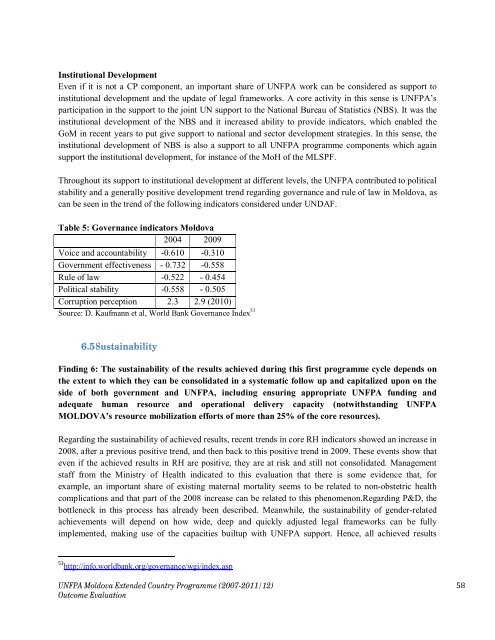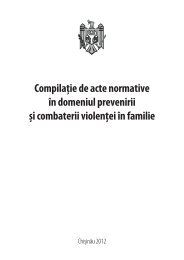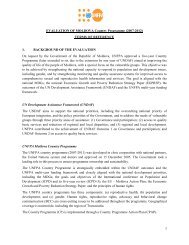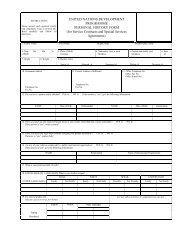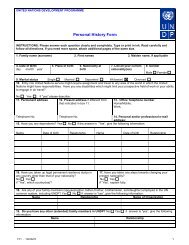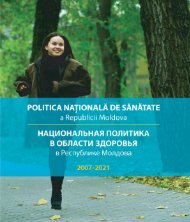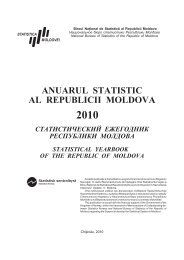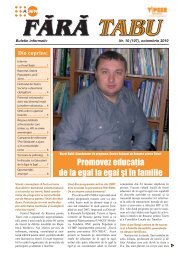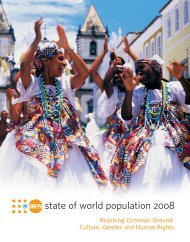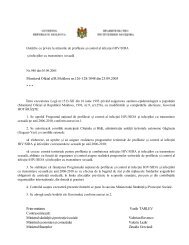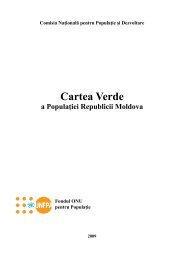Country Programme (2007-2011/2012) evaluation - UNFPA Moldova
Country Programme (2007-2011/2012) evaluation - UNFPA Moldova
Country Programme (2007-2011/2012) evaluation - UNFPA Moldova
Create successful ePaper yourself
Turn your PDF publications into a flip-book with our unique Google optimized e-Paper software.
Institutional Development<br />
Even if it is not a CP component, an important share of <strong>UNFPA</strong> work can be considered as support to<br />
institutional development and the update of legal frameworks. A core activity in this sense is <strong>UNFPA</strong>’s<br />
participation in the support to the joint UN support to the National Bureau of Statistics (NBS). It was the<br />
institutional development of the NBS and it increased ability to provide indicators, which enabled the<br />
GoM in recent years to put give support to national and sector development strategies. In this sense, the<br />
institutional development of NBS is also a support to all <strong>UNFPA</strong> programme components which again<br />
support the institutional development, for instance of the MoH of the MLSPF.<br />
Throughout its support to institutional development at different levels, the <strong>UNFPA</strong> contributed to political<br />
stability and a generally positive development trend regarding governance and rule of law in <strong>Moldova</strong>, as<br />
can be seen in the trend of the following indicators considered under UNDAF.<br />
Table 5: Governance indicators <strong>Moldova</strong><br />
2004 2009<br />
Voice and accountability -0.610 -0.310<br />
Government effectiveness - 0.732 -0.558<br />
Rule of law -0.522 - 0.454<br />
Political stability -0.558 - 0.505<br />
Corruption perception 2.3 2.9 (2010)<br />
Source: D. Kaufmann et al, World Bank Governance Index 53<br />
6.5 Sustainability<br />
Finding 6: The sustainability of the results achieved during this first programme cycle depends on<br />
the extent to which they can be consolidated in a systematic follow up and capitalized upon on the<br />
side of both government and <strong>UNFPA</strong>, including ensuring appropriate <strong>UNFPA</strong> funding and<br />
adequate human resource and operational delivery capacity (notwithstanding <strong>UNFPA</strong><br />
MOLDOVA’s resource mobilization efforts of more than 25% of the core resources).<br />
Regarding the sustainability of achieved results, recent trends in core RH indicators showed an increase in<br />
2008, after a previous positive trend, and then back to this positive trend in 2009. These events show that<br />
even if the achieved results in RH are positive, they are at risk and still not consolidated. Management<br />
staff from the Ministry of Health indicated to this <strong>evaluation</strong> that there is some evidence that, for<br />
example, an important share of existing maternal mortality seems to be related to non-obstetric health<br />
complications and that part of the 2008 increase can be related to this phenomenon.Regarding P&D, the<br />
bottleneck in this process has already been described. Meanwhile, the sustainability of gender-related<br />
achievements will depend on how wide, deep and quickly adjusted legal frameworks can be fully<br />
implemented, making use of the capacities builtup with <strong>UNFPA</strong> support. Hence, all achieved results<br />
53 http://info.worldbank.org/governance/wgi/index.asp<br />
<strong>UNFPA</strong> <strong>Moldova</strong> Extended <strong>Country</strong> <strong>Programme</strong> (<strong>2007</strong>-<strong>2011</strong>/12)<br />
Outcome Evaluation<br />
58


